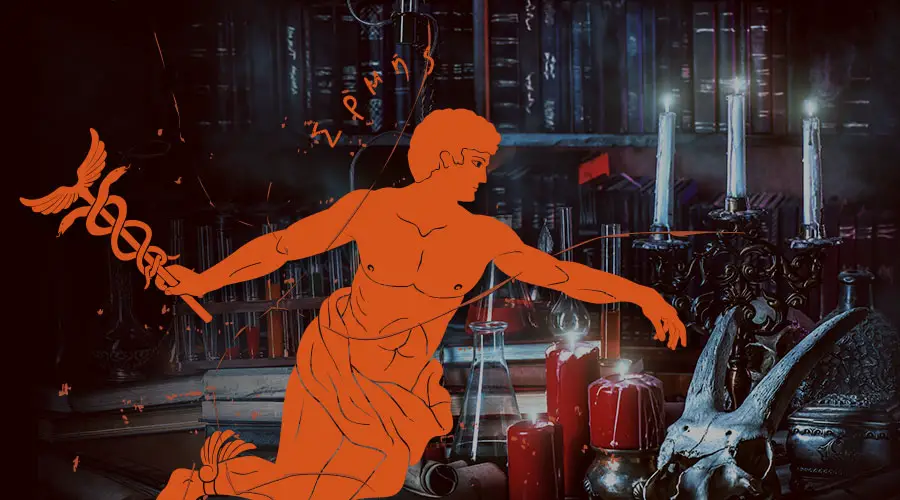The ancient practice of alchemy has its roots in at least ancient Egypt, but can be traced beyond our world and has divine sources. Alchemy was introduced to the world by an immortal being during ancient Egypt and Greece. Who was this ancient god of alchemy?
While alchemy is a practice rather than a form of deity worship, the god Hermes is the most important god in alchemy, because he brought knowledge of alchemy to the world. He is considered the messenger of the gods, and was also known as Thoth, and Hermes Trismegistus.
To students of alchemical and esoteric thought, Hermes is the great teacher to the world, without whom we would never learned how to read and write, nor had knowledge of alchemy.

The Divine Source of Alchemical Knowledge
Hermes, was also known as Thoth during ancient Egypt, and later Hermes Trismegistus, is credited with bringing the knowledge of alchemy to the world. According to the Hermetic philosophy, Hermes Trismegistus was the author of the Hermetic Corpus, a body of texts that contained the secrets of alchemy.
Hermes Trismegistus was said to have received his divine wisdom during an encounter with the Great Pymander, a large dragon. While wandering, Poimandres the dragon appeared before him, declaring that he is the Mind of the Universe. Hermes asked to be shown the true nature of the universe, and the Poimandres as long as Hermes holds an image of a dragon in his mind. Hermes was then lifted above the material universe, and experienced a series of sounds and visions showing the elements of the material world, such as light and dark, and earth and water, being remixed in new ways. You can read a more details of Herme’s encounter with the the Great Pymander here.

The teachings of Hermes were passed down through the ages, eventually reaching the alchemists of medieval Europe. The Hermetic Corpus was seen as a source of great wisdom and was widely studied and revered by alchemists.
Hermes, Messenger of the Gods
Hermes was the son of Zeus and the nymph Maia and was considered to be one of the twelve major gods in the ancient Greek pantheon.
Hermes was known for his many roles and attributes. He was the god of commerce, thieves, and messengers, and was often depicted as a messenger between the gods and mortals. He was also associated with writing, knowledge, and divination, and was considered to be a patron of travelers, herdsmen, and thieves.
In addition to his practical roles, Hermes was also seen as a trickster and a shape-shifter, and was known for his cunning and wit. He was a popular and beloved figure in Greek mythology, and was often depicted as a charming and mischievous figure.
Hermes was also the inventor of the lyre, a musical instrument that he is often depicted playing. He was said to have helped the great hero Odysseus on his journey home from the Trojan War. You can read more about Hermes here.
Alchemy is a Branch of Hermeticism
Alchemy is considered a branch of Hermeticism, the system of philosophy Hermes brought to the world, which reveals truths and secrets of the universe.
Hermeticism teaches that there is a divine and universal wisdom that can be understood and experienced by those who seek it. This wisdom is said to be accessible through meditation, contemplation, and the study of sacred texts.
Alchemy is an ancient philosophical and protoscientific tradition that aimed to transform matter, both on a physical and spiritual level. Alchemists sought to transform base metals into gold, to create the Philosopher’s Stone (a legendary substance with the power to grant immortality), and to find a cure for all diseases. In addition to these practical goals, alchemy was also seen as a means of spiritual transformation, and the alchemical process was often viewed as a metaphor for the journey of the soul towards enlightenment. You can learn more about the objectives of alchemy here.

Hermeticism and alchemy were popular during the medieval period, and many researchers saw their work as a form of Hermetic practice. The Hermetic Corpus was widely studied and revered by alchemists, and the teachings of Hermes Trismegistus were seen as a source of wisdom and guidance in their work. In this sense, Hermeticism provided the spiritual and philosophical foundation for alchemy, which was studied and expanded upon by the scholars of medieval Europe, as well as elsewhere in the world.
Thoth, Hermes, and Hermes Trismegistus
Thoth and Hermes are two names for the same god in different cultures and belief systems. Thoth was the ancient Egyptian god of writing, knowledge, magic, and the moon. He was revered as the patron of scribes and was seen as the embodiment of wisdom and learning. Thoth was also associated with the creation of the world and was said to have played a role in the judgment of the dead in the afterlife. You can read more about the syncretism of Thoth and Hermes here.
Hermes was the ancient Greek god of commerce, thieves, and messengers. He was also associated with writing, knowledge, and divination. Like Thoth, Hermes was revered as a patron of learning and wisdom, and was seen as a messenger between the gods and mortals.
Over time, the two gods came to be seen as a single deity, known as Hermes Trismegistus, or “Hermes the Thrice-Great”. This fusion of the two gods was likely influenced by the close cultural and trade relationships between Greece and Egypt during the Hellenistic period, and by the similarities in the attributes and roles of the two gods.
The Islamic Perspective on Hermes
When studying the history of alchemy, it is interesting to see it become rediscovered by the Islamic world, and then later be embraced by the Europeans. Since knowledge of alchemy is believed to have come from Hermes, what do the alchemists in the Islamic world think of this Greek deity?
As with any religious or cultural group, opinions on Hermes, the Greek god, among Muslims can vary widely. However, generally speaking, Muslims do not worship or venerate Greek gods as they believe in the strict monotheism of Islam. In Islam, the worship of gods other than the one true God, Allah, is considered to be a form of idolatry and is strictly prohibited.
That being said, classical Greek and Roman mythology, including the stories of Hermes, were widely studied and influential in the Islamic world, particularly during the Islamic Golden Age. Muslim scholars and intellectuals were interested in the classics of Greek and Roman literature, including works on philosophy, science, and mythology. Some Muslims saw the study of Greek literature as a way to gain a deeper understanding of the natural world and the workings of the universe. You can read more about Islamic alchemy here.

So, while Muslims do not worship Hermes as a god, they may have an appreciation for the cultural and historical significance of the character and his role in classical mythology. It is worth noting that attitudes and beliefs can vary widely within the diverse Muslim community, and it is not possible to make sweeping generalizations about what all Muslims think of any particular figure or concept.
Recommended Reading
If you want to continue exploring this subject more deeply, you can see which books I recommend by clicking here.

